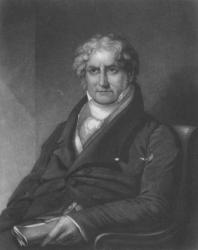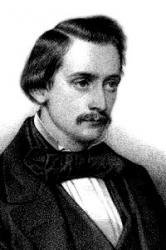1805 - 1877 Meter: 7.7.7.7 D Author of "Jesus, Full of Love Divine" in The Cyber Hymnal Gough, Benjamin, was born at Southborough, Kent, in 1805, and died Nov. 28,1877. He was engaged in mercantile pursuits in London for some years. After retiring from business he resided at Mountfield, Faversham. He was a member and lay preacher of the Wesleyan denomination. His poetical works include:—
(1) Lyra Sabbatica, Lon., 1865; (2) Kentish Lyrics, London, 1867; (3) Hymns of Prayer and Praise, London, 1875; and several minor publications, the most important being (4) Protestant Hymns & Songs for the Million, Lon., 1878; (5) Songs from the Woodlands, and Other Poems, Lon., 1872; and (6) Christmas Carols and New Year's Songs, Lon. (n.d.).
Of Mr. Gough's hymns, about 20 are in common use in Great Britain and America, and of these the most popular and widely used is "Awake, awake, O Zion," q.v. Although possessing many features of popularity, his hymns do not rank high as literary productions. His works are also marred by numerous and feeble imitations of the great lyrics of the Church. Many of his earlier hymns were rewritten for his Hymns of Prayer & Praise, very much to their disadvantage. In addition to those which are annotated under their first lines the following are in common use:—
1. Be thou faithful unto death. Faithfulness. Appeared in his Lyra Sabbatica, &c, 1865, p. 77, in 3 stanzas of 8 lines, and entitled "Christian Fidelity." In 1867 it was transferred to the People's Hymnal, and again, in 1875, to the New Mitre-Hymnal, No. 151.
2. Blessed are the dead who die. Burial. Appeared in his Lyra Sabbatica, 1865, p. 89, in 4 stanzas of 8 lines and headed "For the dead in Christ." In Hatfield's Church Hymn Book, N. Y., 1872, it is slightly altered.
3. Christ is risen from the dead. Easter. In Lyra Sabbatica, 1865, p. 96, in 6 stanzas of 8 lines, as "An Easter Carol;" but in his Hymns of Prayer & Praise, 1875, p. 49, this is changed to "An Easter Hymn." In the New Mitre-Hymnal, 1875, stanzas iv., v. are omitted.
4. Come, children, and join with ardour divine. Missions. In his Lyra Sabbatica, 1865, p. 159, in 9 stanzas of 3 lines, and entitled, "Children's Missionary Hymn" and the Hymns of Prayer & Praise, 1875, No. 39, in 4 stanzas of 6 lines. In the latter work it is rewritten, very much to its disadvantage. The 1865 text is followed in the Methodist Sunday School Hymn Book, 1879, No. 562.
5. Come to Bethlehem and see. Christmas. Appeared in his Christmas Carols, &c, n.d., p. 21, in 5 stanzas of 8 lines. In the New Mitre-Hymnal, 1875, No. 26, it is dated 1873.
6. For all the [Thy] saints in heaven and earth. All Saints. From his Lyra Sabbatica, 1865, p. 119, in stanzas of 8 lines into Snepp's Songs of Grace & Glory, 1872, No. 148.
7. God the Father, full of grace. Holy Trinity, or Public Worship. Appeared in his Kentish Lyrics, 1867, p. 97, in 4 stanzas of 6 lines; and rewritten in a far less acceptable form, in his Hymns of Prayer & Praise, 1875, p. 80, in 4 stanzas of 6 lines. No. 8 in the Methodist Sunday School Hymn Book, 1879, is from the 1867 text.
8. Ho, every one that thirsteth. Invitation. Published in his Lyra Sabbatica, 1865, p. 83, in 5 stanzas of 8 lines; and, altered to its disadvantage, in his Hymns of Prayer & Praise. 1875, p. 33, in 5 stanzas of 8 lines. No. 291 in Methodist Sunday School Hymn Book, 1879 is from the 1865 text.
9. How beauteous on the mountains. Missions. In Lyra Sabbatica, 1865, p. 23, in 5 stanzas of 8 lines; and his Hymns of Prayer & Praise, 1875, p. 20. In Hatfield's Church Hymn Book, N. Y., 1872, No. 1246, is composed of stanzas i.-iii.
10. In Thy temple we adore Thee, gentle, pure, and holy Child. Christmas. In his Christmas Carols, &c, n.d., p. 39, in 3 stanzas of 4 double lines. In the New Mitre-Hymnal, 1875, No. 30, it is dated 1873, and begins, “In Thy cradle we adore Thee."
11. Jesus, full of love divine. Love of Jesus. Written in 1874, and published in the New Mitre-Hymnal, 1875, No. 84.
12. Lift the gospel banner. Missions. This is attributed to B. Gough, on the authority of Mrs. Gough. It is not in his published works, and its first appearance is unknown. In the Methodist Sunday School Hymn Book, 1879, No. 394, it is in 4 stanzas of 8 lines.
13. 0 Jesus, behold the lambs of Thy fold. Sunday. From his Lyra Sabbatica, 1865, p. 103, in 9 stanzas of 3 lines into the Methodist Sunday School Hymn Book, 1879, No. 511, with the omission of stanza ii.
14. Quicken, Lord, Thy Church and me. Whitsuntide. Appeared in his Lyra Sabbatica, 1865, p. 16, in 6 stanzas of 6 lines; and in his Hymns of Prayer & Praise, 1875, p. 6; and headed "For another Pentecost." It is No. 363, in Snepp's Songs of Grace & Glory, 1872.
15. Sing we merrily to God. Praise. Appeared in his Lyra Sabbatica, 1865, p. 65, in 5 stanzas of 8 lines, and his Hymns of Prayer & Praise, 1875, p. 27. In the New Mitre-Hymnal, 1875, No. 138, st. iii. is omitted.
16. There is a land of rest. Heaven. From his Lyra Sabbatica, 1865, p. 105, in 4 stanzas of 8 lines into the New Mitre-Hymnal, 1875, No. 155, where it is appointed for St. Mark's Day.
17. There is no condemnation. Peace. In his Lyra Sabbatica, 1865, p. 25, and his Hymns of Prayer & Praise, 1875, p. 22, in 3 stanzas of 8 lines, and headed "No Condemnation." In Snepp's Songs of Grace & Glory, 1872, it is No. 682.
18. Uplift the blood-red banner. Missions. In his Lyra Sabbatica, 1865, p. 155, and his Hymns of Prayer & Praise, 1875, p. 37, in 4 stanzas of 8 lines, and headed “For the Conversion of the World." It is No. 408 in the People's Hymnal, 1867; No. 88 in the New Mitre-Hymnal, 1875, &c.
-- John Julian, Dictionary of Hymnology (1907)
Benjamin Gough


 My Starred Hymns
My Starred Hymns








